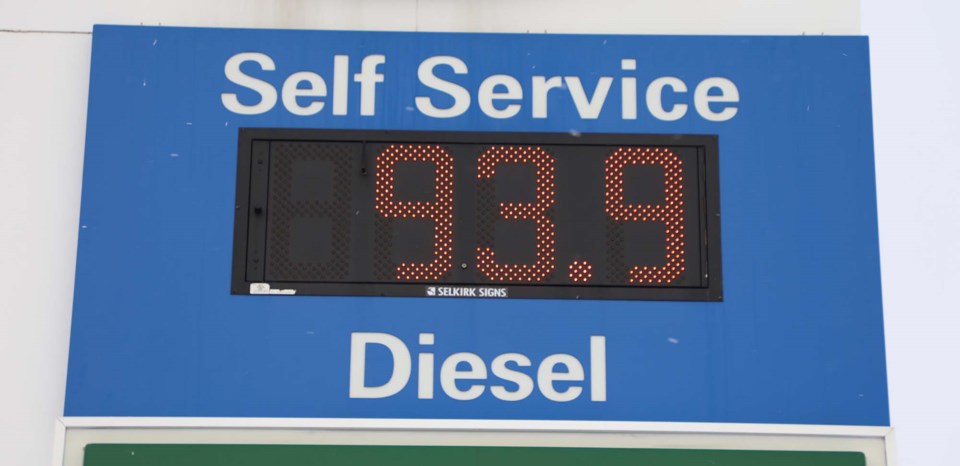Albertans will pay about 38 cents more per litre at the pump in 10 years under the federal government’s new climate plan, but will also get all that back and more through carbon tax rebates.
Prime Minister Justin Trudeau and other federal officials announced details of the new A Healthy Environment and a Healthy Economy climate change plan on Dec. 11.
The roughly $15-billion plan outlines how the federal government aims to reduce Canada’s greenhouse gas emissions by 32 to 40 per cent below 2005 levels by 2030, or a bit more than was required under the Paris Agreement, while maintaining strong economic growth.
If we trust scientists to manage our health during the pandemic, we must also trust them to manage other existential threats, such as climate change, Trudeau said.
“There is no vaccine against a polluted planet. It is up to us to act, because there is a real cost to pollution."
The centrepiece of the plan was an escalation of the federal carbon tax on fossil fuels. The tax is at $30/tonne of carbon emissions today, which adds about $0.07 to the price of a litre of gasoline in Alberta, and is set to rise $10 a year until it reaches $50/tonne by 2022. The plan would see the tax reach $170/tonne by 2030, adding about $0.38 to a litre of gas, and rise by $15 a year starting in 2023.
“We know Canadians understand that (we) can no longer be free to pollute anywhere in the country,” Trudeau said, and a rising carbon price would send people a clear signal on the need to address climate change and the economic opportunities doing so involved.
Albert Environment Minister Jason Nixon called the tax “yet another attack on Alberta’s economy and Alberta’s jurisdiction,” arguing it would lead to lost jobs and make it more expensive for people to drive to work and heat their homes.
“This is not the time to even be considering increasing the cost of living for people in Alberta,” he said, given the pandemic and the state of the economy.
Green economics
Nixon knows perfectly well that all money Albertans pay through the carbon tax goes back directly to them through carbon tax rebates and incentive programs, said University of Ottawa economist Nicholas Rivers (who holds the Canada Research Chair in climate and energy policy).
The federal plan projected that the average Alberta family of four would get a $3,242 carbon tax rebate in 2030, or slightly more than they would pay in carbon tax.
While some jobs would be affected by a higher carbon price, Rivers said economists have found carbon taxes have little to no impact on employment, as energy isn’t a major cost for most businesses. His analysis of B.C.’s carbon tax found it reduced that province’s emissions by five to 15 per cent with little impact on that province’s economy, for example. This happened, he explained, because when industries face higher costs due to carbon, they cut carbon, not jobs, through investing in energy efficiency or carbon-capture, often creating jobs in the process.
Green benefits
Rivers said this new climate plan was the first he’d seen come out of the federal government that made a significant dent in the climate problem.
In addition to its ambitious targets, Rivers said the plan’s use of a carbon tax, rather than extensive regulations or targeted rebates, gave people the flexibility needed to find the most cost-effective way to reduce emissions for their personal circumstances. For him, that might mean reinsulating the basement of his really old house. For someone else, it might mean a heat pump or an electric water heater.
The plan included $2.6 billion over seven years to train energy auditors and fund $5,000 home energy efficiency grants and about a million free home energy audits.
This would help people manage their energy use and create more of a market for energy-efficient homes, said energy efficiency expert Godo Stoyke of Carbon Busters. Still, he is more enthusiastic about the plan’s commitment to create a net-zero ready building code by 2030, as it is cheaper to build something right the first time than it is to retrofit it later, and to create a low-cost loan program for more significant energy retrofits.
The plan extends the current $5,000 zero-emission vehicle rebate for two years and invests $150 million into charging and refueling stations.
Electric Vehicle Association of Alberta director Andrew Bell said that rebate was what pushed him to ditch his Toyota Prius for a Tesla Model 3 recently, and predicted the rebate could help more drivers make the jump to electric vehicles. Electric cars cost about $10,000 more than gasoline ones, and this rebate took care of half that difference.
Bell said transportation makes up about a quarter of Alberta’s carbon emissions. You can cut those emissions by about 41 per cent if you drive an electric car – by 100 per cent, if you bought green power as he did – and also save a bundle on fuel and maintenance.
“Personally, I’m saving over $2,000 a year,” he said, adding he expects to earn back the extra cash he spent to get an electric car in about three years.
Stoyke said this federal plan would give businesses the certainty they need to plan capital investments and encourage them to invest in green technologies.
Stoyke and Bell said Albertans could prepare for the plan’s effects by looking at their homes and habits. You might not be able to buy an electric car, but you probably can idle less and plan your trips to reduce fuel use. You can also borrow a home energy audit kit from the library to check if you have an inefficient fridge to replace.
The plan can be found at bit.ly/34diWTN.
Read more from StAlbertToday.ca



